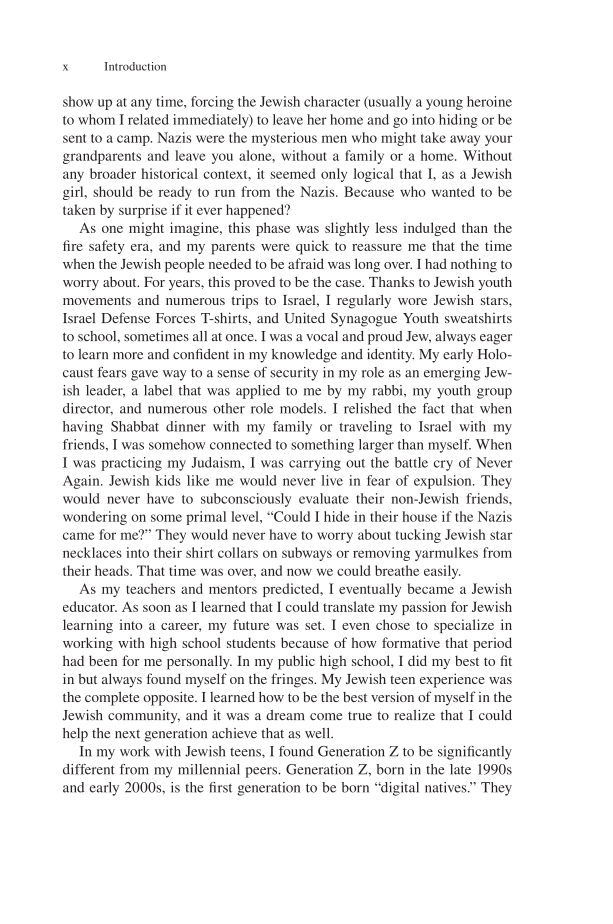x Introduction show up at any time, forcing the Jewish character (usually a young heroine to whom I related immediately) to leave her home and go into hiding or be sent to a camp. Nazis were the mysterious men who might take away your grandparents and leave you alone, without a family or a home. Without any broader historical context, it seemed only logical that I, as a Jewish girl, should be ready to run from the Nazis. Because who wanted to be taken by surprise if it ever happened? As one might imagine, this phase was slightly less indulged than the fire safety era, and my parents were quick to reassure me that the time when the Jewish people needed to be afraid was long over. I had nothing to worry about. For years, this proved to be the case. Thanks to Jewish youth movements and numerous trips to Israel, I regularly wore Jewish stars, Israel Defense Forces T-shirts, and United Synagogue Youth sweatshirts to school, sometimes all at once. I was a vocal and proud Jew, always eager to learn more and confident in my knowledge and identity. My early Holo- caust fears gave way to a sense of security in my role as an emerging Jew- ish leader, a label that was applied to me by my rabbi, my youth group director, and numerous other role models. I relished the fact that when having Shabbat dinner with my family or traveling to Israel with my friends, I was somehow connected to something larger than myself. When I was practicing my Judaism, I was carrying out the battle cry of Never Again. Jewish kids like me would never live in fear of expulsion. They would never have to subconsciously evaluate their non-Jewish friends, wondering on some primal level, “Could I hide in their house if the Nazis came for me?” They would never have to worry about tucking Jewish star necklaces into their shirt collars on subways or removing yarmulkes from their heads. That time was over, and now we could breathe easily. As my teachers and mentors predicted, I eventually became a Jewish educator. As soon as I learned that I could translate my passion for Jewish learning into a career, my future was set. I even chose to specialize in working with high school students because of how formative that period had been for me personally. In my public high school, I did my best to fit in but always found myself on the fringes. My Jewish teen experience was the complete opposite. I learned how to be the best version of myself in the Jewish community, and it was a dream come true to realize that I could help the next generation achieve that as well. In my work with Jewish teens, I found Generation Z to be significantly different from my millennial peers. Generation Z, born in the late 1990s and early 2000s, is the first generation to be born “digital natives.” They
Document Details My Account Print multiple pages
Print
You have printed 0 times in the last 24 hours.
Your print count will reset on at .
You may print 0 more time(s) before then.
You may print a maximum of 0 pages at a time.

































































































































































































